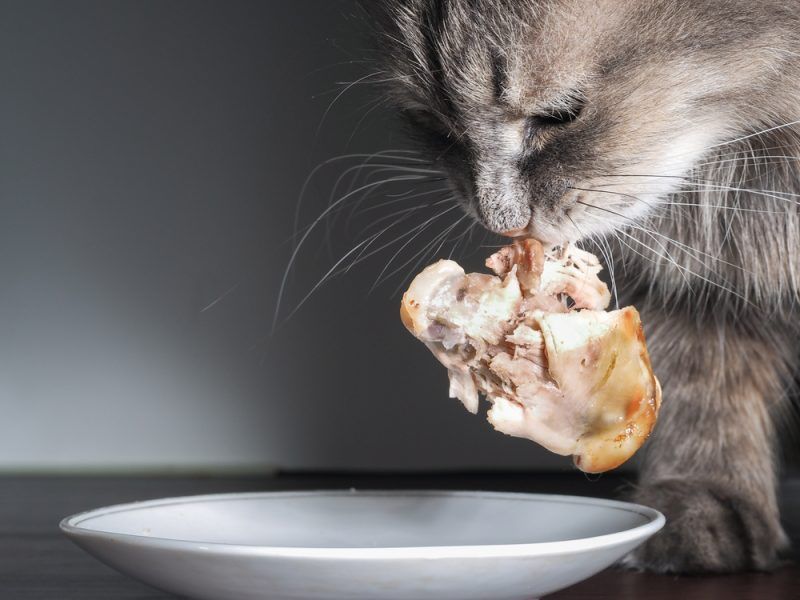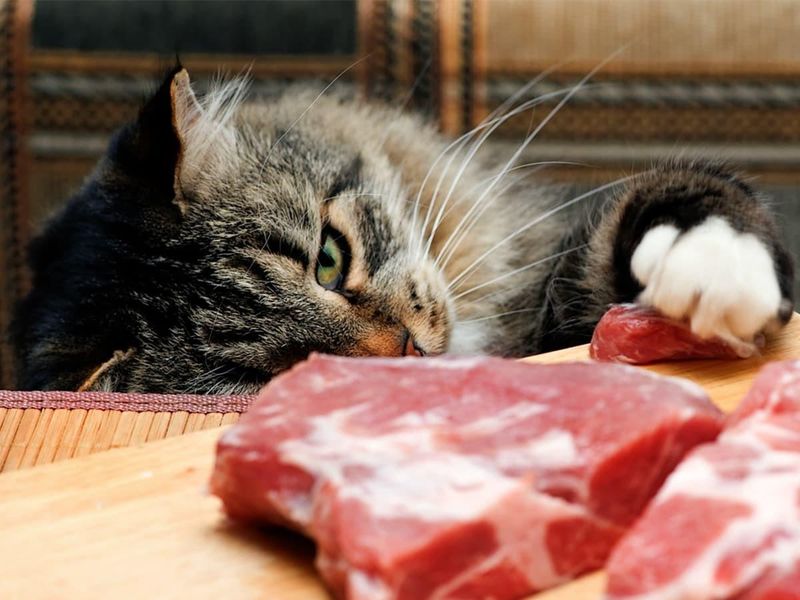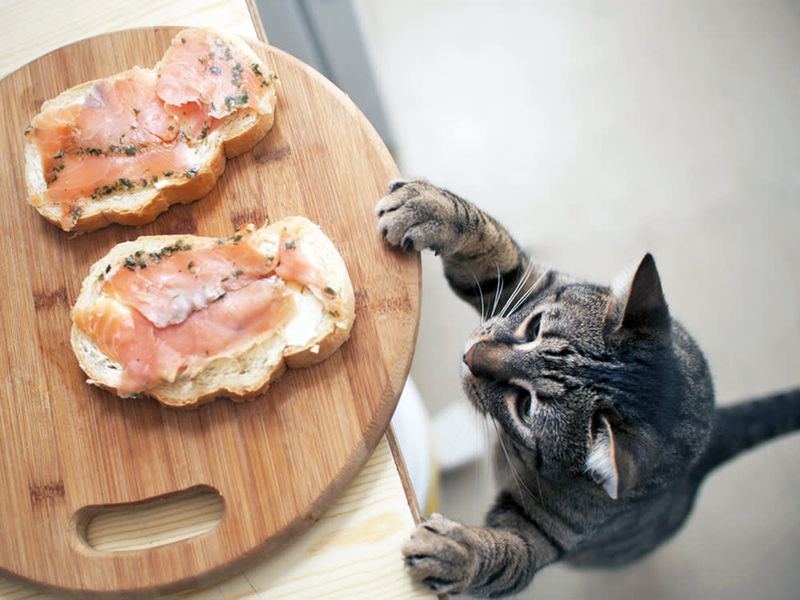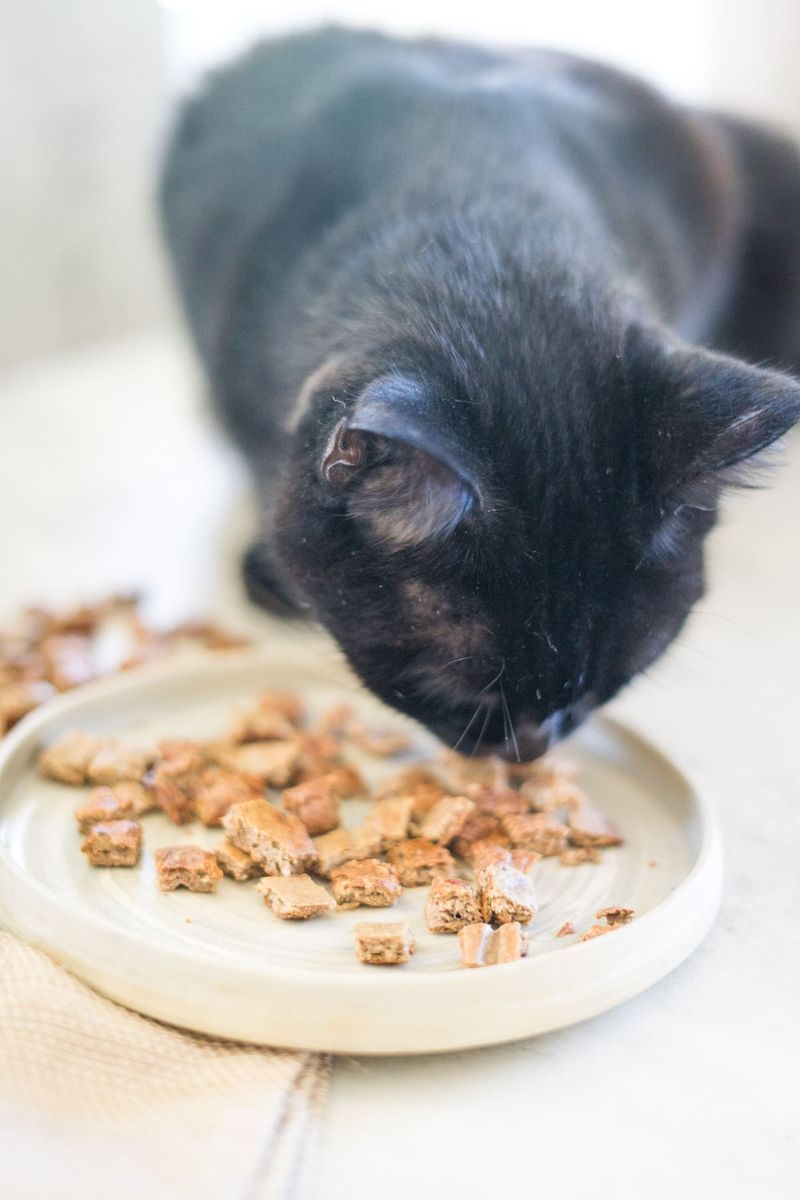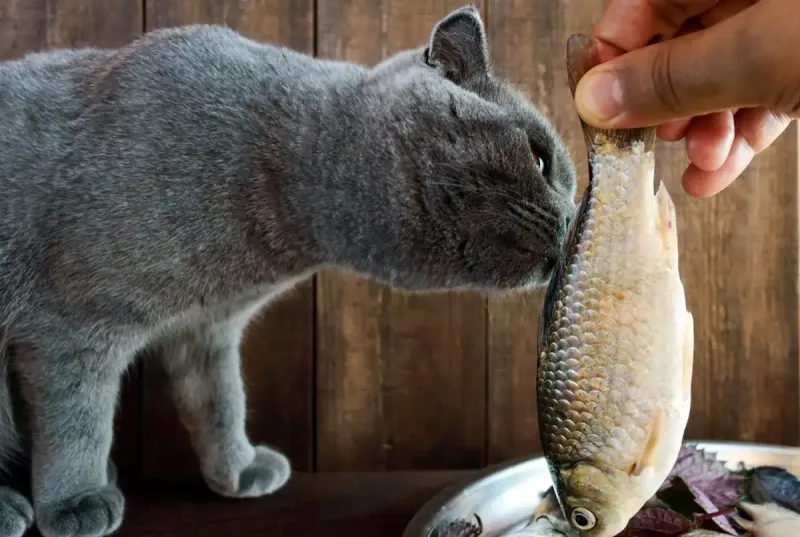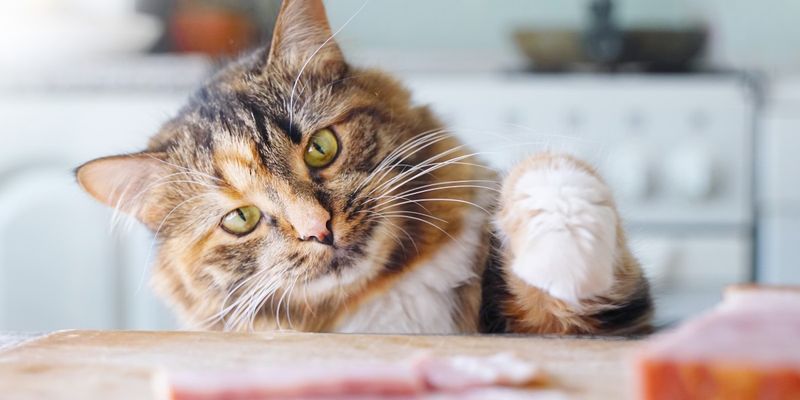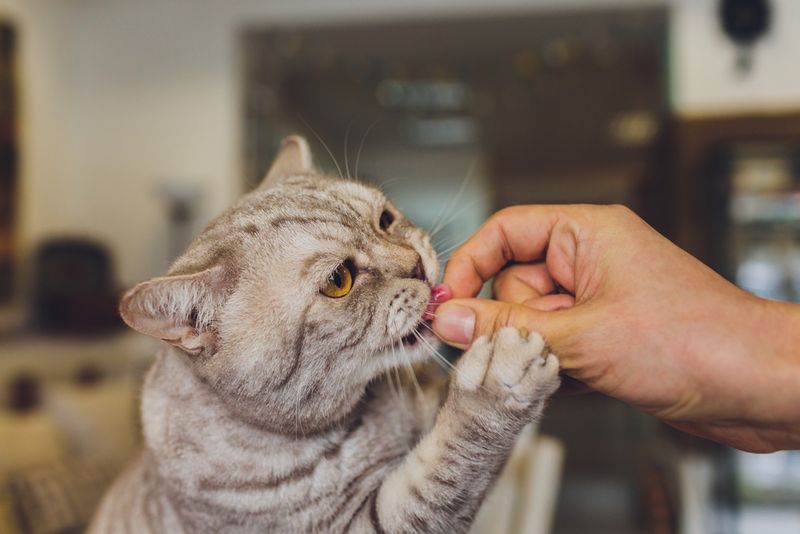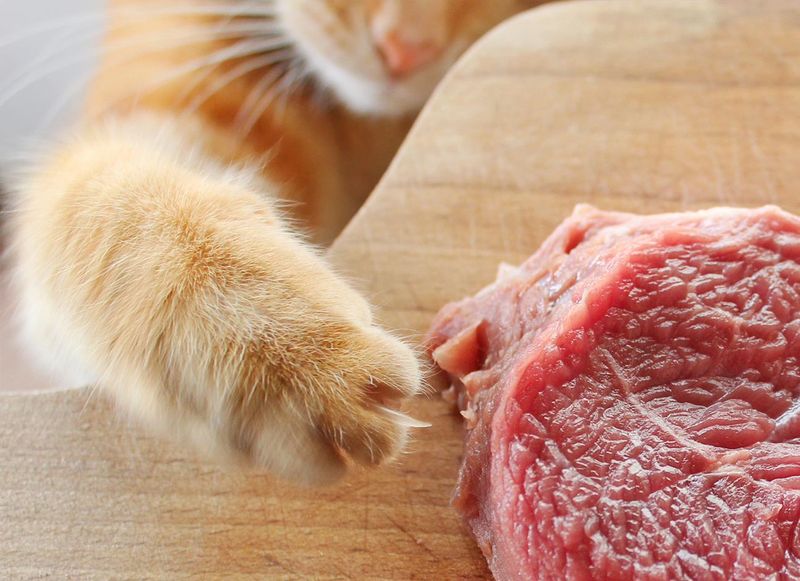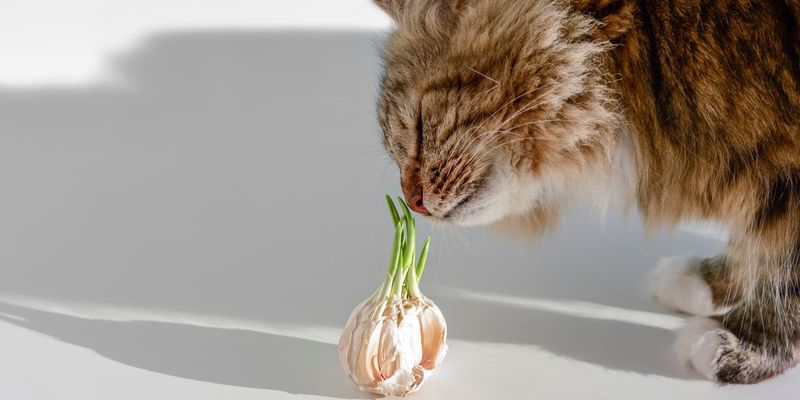📖 Table of Content:
Cats are obligate carnivores, meaning their bodies are designed to thrive on animal-based proteins. Their nutritional needs are precise, requiring specific amino acids and nutrients found only in meat. A well-balanced diet supports everything from muscle development to immune function.
While commercial cat foods are formulated to meet these needs, many owners choose to offer fresh meat as an occasional supplement. Certain meats can provide enrichment and variety, but only when prepared and served safely. Not all proteins are created equal when it comes to feline health.
Some meats contain harmful ingredients, bacteria, or excessive fat that can upset a cat’s system. Others may lack the essential nutrients cats need to stay balanced and strong. Knowing the difference is key to keeping cats both happy and healthy.
1. Cooked Chicken
Lean, boneless chicken serves as an excellent protein source for your feline companion. The mild flavor appeals to even the pickiest eaters, making it a reliable go-to when your cat needs a special treat.
Always ensure the chicken is thoroughly cooked without any seasonings, especially garlic or onion which are toxic to cats. Remove all bones, as they pose serious choking hazards and can splinter, potentially causing internal injuries.
Moderation remains key—too much chicken can upset your cat’s balanced diet. A small piece (about the size of your thumb) once or twice a week provides a healthy supplement to regular cat food.
2. Turkey
Plain, cooked turkey meat offers cats a delicious protein boost similar to chicken. White meat portions contain less fat, making them healthier options for your feline friend’s occasional snack.
Remove all skin, bones, and fatty portions before serving. The skin often contains seasonings harmful to cats, while the fat can lead to digestive upset and even pancreatitis in sensitive cats.
Many cat owners share a tiny bit of their Thanksgiving turkey with their pets, but remember that moderation prevents digestive issues. A small morsel of plain turkey breast makes a wonderful treat without disrupting their regular diet.
3. Lean Beef
Cats naturally gravitate toward beef’s rich aroma and flavor. The protein-packed meat contains essential amino acids that support your cat’s muscle development and overall health when offered occasionally.
Ground beef should be thoroughly cooked and drained of fat before serving. Avoid seasoned cuts like steak that might contain butter, garlic, or other additives harmful to felines.
Some cats with sensitive stomachs might experience digestive upset with beef. Start with a tiny amount—about the size of a pea—to test your cat’s tolerance. If they handle it well, beef can become an occasional high-value treat in their diet rotation.
4. Salmon
Few things excite a cat more than the smell of freshly cooked salmon. Packed with omega-3s, it nourishes their skin, keeps their coat glossy, and supports brain health. It’s a flavorful, nutrient-rich treat they’ll love.
Always thoroughly cook salmon to eliminate parasites that could harm your cat. Remove all bones meticulously, as fish bones are particularly dangerous due to their small size and sharp edges.
Canned salmon packed in water (not oil or brine) can be a convenient alternative to fresh. Just a small bite once or twice a week is plenty—too much fish can lead to thiamine deficiency over time if it becomes a major part of their diet.
5. Liver
Loaded with iron and vitamin A, chicken liver is a nutrient-dense treat your cat’s body will thank you for. The bold taste is a favorite among felines, even the fussy ones. It’s a small bite with big benefits.
Cooking liver properly neutralizes harmful bacteria while preserving its nutritional benefits. Boil or pan-cook without seasonings until thoroughly done, then cool completely before serving in tiny amounts.
Despite its nutritional benefits, liver should only be an occasional treat. Too much vitamin A from liver can lead to hypervitaminosis A, causing bone deformities and other serious health issues. Limit liver treats to once weekly at most, in portions smaller than your fingertip.
1. Raw Fish
Feeding raw fish to cats is risky due to potential parasites and harmful bacteria. It also contains thiaminase, which destroys thiamine—an essential B vitamin.
Regular consumption of raw fish leads to thiamine deficiency, resulting in neurological problems including seizures, loss of coordination, and even death if left untreated. The small, sharp bones present additional choking and internal puncture risks.
Cats’ attraction to fish doesn’t mean it’s naturally good for them—domesticated cats evolved primarily eating small land prey. If you want to offer fish, always thoroughly cook it first, removing all bones, and serve only occasionally as a special treat rather than a dietary staple.
2. Processed Meats
Deli meats, bacon, hot dogs, and sausages contain excessive sodium levels that can harm your cat’s kidneys and cardiovascular system. One slice of deli ham contains more sodium than a cat should consume in an entire day.
Processed meats typically contain preservatives like nitrates and nitrites that may lead to digestive upset in cats. Many also include garlic and onion powder—both toxic to felines—as flavor enhancers.
The high fat content in processed meats contributes to obesity and pancreatitis risk in cats. Despite your cat’s begging when you make a sandwich, resist sharing these foods that offer virtually no nutritional benefit while posing significant health risks.
3. Fat Trimmings
Those juicy meat trimmings might look like a treat, but for cats, they’re a hidden hazard. Too much fat can inflame the pancreas and cause serious health issues. Pancreatitis leads to vomiting, digestive upset, and pain that no pet should endure.
Cats lack the digestive enzymes needed to process large amounts of fat efficiently. Even small portions of fatty meat can overwhelm their system, leading to digestive upset at minimum and potentially requiring hospitalization in severe cases.
Fat trimmings also frequently contain seasonings, marinades, or cooking oils that add additional harmful ingredients to an already problematic food. Instead of sharing these risky scraps, offer your cat a small piece of lean, unseasoned meat instead.
4. Raw Pork
That piece of raw pork might look fresh, but it could be harboring Trichinella spiralis, a harmful parasite. If ingested, it can cause trichinosis—a painful illness marked by sore muscles, fever, and distress. A well-cooked meal is far safer for feline digestion.
Beyond parasites, raw pork may harbor bacteria like Salmonella and E. coli that can sicken both cats and humans handling the meat. Cats with compromised immune systems face even greater dangers from these pathogens.
While properly cooked, plain pork in small amounts is generally safe, the risks associated with raw or undercooked pork far outweigh any potential benefits. Always thoroughly cook pork to an internal temperature of 145°F (63°C) before considering sharing a tiny portion with your feline friend.
5. Seasoned Meats
That tasty seasoned meat might be fine for humans, but it’s dangerous for cats. Ingredients like garlic and onion can damage their red blood cells, causing severe anemia. Just a small bite can have serious consequences.
Salt, another common seasoning, leads to sodium ion poisoning in cats when consumed in excess. Symptoms include excessive thirst, urination, vomiting, diarrhea, tremors, seizures, and in severe cases, death.
Spicy seasonings irritate your cat’s digestive tract, causing uncomfortable burning sensations and digestive upset. When sharing meat with your cat, only offer plain, unseasoned portions specifically set aside before any flavoring is added during your cooking process.

